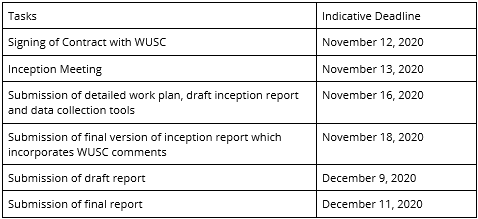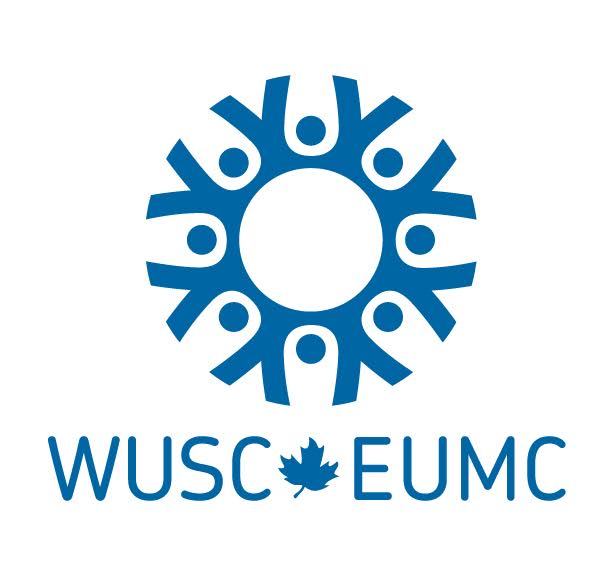Job Description
TERMS OF REFERENCE - LOCAL CONSULTANCY, GENDER ANALYSIS STUDY (Ghana)
- Project: WUSC’s Volunteer Cooperation Program - IGNI+E - Gender Analysis Study
- Dates: November 16 - December 11, approximately
- Level of effort: approximately 20 working days
- Location: Ghana
- Budget: Maximum $5000 Canadian Dollars. Financial proposals should reflect the daily rate as well as anticipated operational costs in a table.
- Reports to: Gender Equality and Social Inclusion Advisor
- In-Country Contact: Country Manager
- Application Deadline: November 5, 2020
THE IGNI+E PROJECT (INNOVATIVE GLOBAL NETWORKS FOR INCLUSION + EQUALITY, PRONOUNCED IGNITE)
IGNI+E is a 7-year initiative (2020-2027) that will strengthen the performance of 70+ developing country partner (DCP) organizations to advance gender equality (GE) and economic empowerment for 1.2 million (70% women) poor and marginalized youth, in particular young women, in multiple countries across Asia and Africa. IGNI+E will harness the knowledge, capacity and expertise of skilled Canadians through volunteer mandates to collaborate with DCPs for improved performance in advocating for gender equality and the implementation of more sustainable, innovative and inclusive initiatives targeting poor and marginalized youth, particularly young women. Through DCPs and other country stakeholders, IGNITE will improve the socio-economic well-being of poor and marginalized youth, particularly young women, by generating inclusive, remunerative and sustainable employment and entrepreneurship opportunities. IGNI+Ewill pursue innovative strategies around Gender equality and the empowerment of women and girls and Growth that Works for Everyone action areas of Canada’s FIAP. The initiative directly reflects Canada’s commitments towards SDG 5 (Gender Equality and Empowerment), SDG 8 (Decent Work for All) and SDG 17 (Partnerships for the Goals), as well as the Whistler Principles to accelerate innovation for development impact and the Global Compact on Refugees (GCR).
CONTEXT OF STUDY
Young people are more likely to be unemployed than adults, with the global youth unemployment rate 3 times higher than the adult rate of 4.3% (ILO, 2018). In Sub-Saharan Africa, 67% of employed youth still live in poverty (ILO, 2018). Across most labour market indicators, wide disparities exist between young women and men, underpinning and giving rise to wider gaps during the transition to adulthood. For ex., the labour force participation rate for young men stands at 53.9% compared to 37.3% for young women (ILO 2016). In Sub-Saharan Africa, the percentage of women in the labour market compared to men is higher than any other region, an outcome that masks the fact that young women are more likely than young men to find themselves in precarious work and subject to abusive and demeaning labour (ILO, 2018). Weak formal labour markets in many countries also constrain youth, and especially young women’s access to economic opportunities.
There is a growing body of evidence that specialized employment and entrepreneurship programs do work, especially when they target the marginalized, and when they combine training with other forms of support (WB, 2014). The ability of young women to capture the benefits of economic growth varies greatly by country and by context. However, gendered social norms often constrain young women’s ability to benefit from employment training and entrepreneurship programs, and can restrict and guide their career choices (Saha et al. 2018), including whether or not they enter the labour market at all.
Through IGNI+E, WUSC is responding to some of the above constraints by engaging DCPs through the support of Canadian volunteers, to promote gender equality and facilitate the access of young women to economic opportunities. IGNI+E will take a gender-responsive approach to engage with a wide range of project stakeholders, one which examines and acts upon the root causes of gender and social norms that negatively affect women’s economic empowerment.
THE ASSIGNMENT
a. Nature and Scope
As part of the inception phase of activities for the IGNI+E project, WUSC wishes to hire the services of a consultant to conduct a gender analysis focusing on six specific project locations: Ghana, Malawi, Uganda, Kenya, Sri Lanka and Vietnam. The purpose of the gender analysis is to inform the IGNI+E project planning and the development of the project’s gender strategy. The gender analysis will provide important insights into key sensitive gender considerations needed by the project to ensure that youth, and young vulnerable girls, in particular, benefit from project interventions on the one hand, and the gaps in the institutional capacities of partner organisations to effectively deliver the gender-sensitive programming that targets youth and young women in particular. The gender analysis should therefore seek to explore some of the root causes of gender and social norms that negatively affect women’s economic empowerment, as well as the labour market constraints that intensify gender inequalities in women’s access to decent and productive work (wage and entrepreneurial). To ensure that project interventions are inclusive, the IGNI+E project is engaging with a range of actors from the government, civil society, local communities, private sector and educational institutions, which should also be the focus of this analysis. The consultant will explore challenges faced by these actors in addressing the identified gender-specific constraints as part of their programming, the range of gender-sensitive approaches employed by partners, and the successes/failures encountered in the use of these approaches.
b. Objectives
The gender analysis will provide critical insights to inform the design of IGNI+E project interventions, thereby contributing to the achievement of the following objectives:
- Increase awareness of norms and practices that perpetuate gender-based inequalities and constrain youth and women’s access to employment programming
- Improve the capacity to develop, test & scale innovative gender-responsive initiatives and services for the equitable economic empowerment of vulnerable youth
- Increase the capacity to develop gender-responsive and environmentally sustainable policies and practices
The analysis should be conducted through a “COVID-19 lens”, taking into consideration the country and local protocols that may have been introduced by the COVID-19 crisis. In addition, with IGNI+E being a Global Affairs Canada (GAC) funded project, due consideration needs to be given for alignment with the Feminist International Assistance Policy (FIAP) of Canada, when conducting the gender analysis.
c. Analysis Framework
The consultant is invited to use a gender analysis framework that will facilitate the identification of the different constraints that young girls face in accessing women’s economic empowerment opportunities and enjoying gender equal rights. These constraints can be those emanating from their own lives (agency), from their entourage with implications for the lives of young girls - relations, or the more structural (structures) barriers within the labour market. To facilitate this, a range of questions have been developed to guide as to the type of information the analysis should capture. These questions are only indicative. Further refinement should be explored collaboratively with the project during the inception report process. The questions have been organised under different categories using the CARE framework for women’s empowerment. However, regardless of the type of framework or method that the consultancy proposes to use, what is most critical is to ensure that the analysis can furnish the project with relevant data that will help it meet the above-mentioned objectives.
d.Respondent segments
Beneficiaries
At least 80% of those to be reached will be poor and marginalised young girls between the ages of 18-35 in the relevant project locations. However, the program does recognise that poor populations do not all have equal weighting, that there are different levels of poverty and marginalisation within each context with each level having a unique set of barriers that differs from another level. It is therefore expected that the consultant will take into consideration these differences in (class / status) societal structures in the definition of respondent populations within the identified project locations. Where possible, respondents should be a representative of the diversity of young marginalised women within the specified project zones, and ensure that the constraints and opportunities raised by the analysis is reflective of this diversity.
Intermediaries (Country Partner Organisations):
The IGNI+E project supports partner organisations that provide services to youth (particularly young women) by strengthening their capabilities in delivering gender sensitive interventions to marginalised youth, particularly young women. These intermediary actors constitute a critical part of the project and their challenges in facilitating access to economic opportunities for young girls needs to be explored. In this respect, the consultant will engage with these actors to understand the general and unique gender related constraints and opportunities they face with respect to facilitating economic empowerment for young women and delivering projects that promote gender equality.
Influencers
Influencers represent categories of people and institutions within project zones that have a critical role to play in influencing the choices of young women with respect to their educational, professional and social outcomes. These include those within the woman’s circle such as family members (male family members, parents etc), community leaders, local community role models and other similar actors. These could also include institutions advocating for a range of reforms with potential transformational impact on the economic empowerment of women among others. The study is expected to further engage with key influencers to understand the underlying factors that inform their actions, and how these can be leveraged for achieving empowerment outcomes for women.
SPECIFIC TASKS
- Develop a detailed inception report and work plan in close consultation with members of the WUSC staff. The inception report will clarify and refine the overall approach, methodology and timing for the study.
- Develop / adapt the framework for conducting the gender analysis for contextual relevance.
- Develop the gender analysis information and data collection tools.
- Participate in an inception meeting with WUSC (to be organized by WUSC).
- Collect data, including reviews of secondary information, focus groups and key informant interviews.
- Prepare reports as documented in deliverables below.
- Prepare recommendations on best practices for translating some of them into solutions for some of the key constraints identified during the analysis.
- Revise reports and recommendations following feedback from WUSC
LEVEL OF EFFORT AND DELIVERABLES
- Inception Meeting
- Submission of detailed work plan, draft inception report and data collection tools
- Submission of final version of inception report which incorporates WUSC comments
- Submission of draft gender analysis report including methodology, findings, and recommendations
- Submission of final gender analysis report including methodology, findings, and recommendations
- A Power-point summary of the gender analysis report
TIMELINES
The contract period will be 20 days including travel time (if necessary) between 16 November 2020 and 11 December 2020. Estimated contributions expected in working days will be determined in consultation with the selected candidate. The candidate will have to put in place all the necessary actions to launch the gender analysis in accordance with the following schedule:

